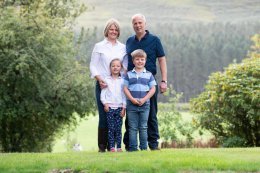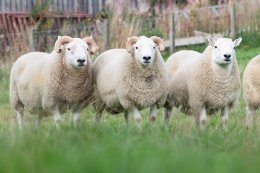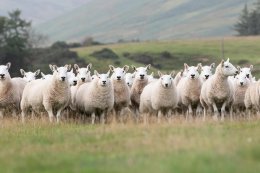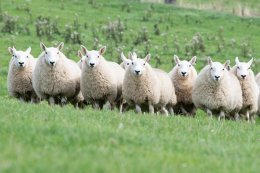Mountbenger
George with his wife Kirsty and their two children, James and Katie

Breeding a productive and hardy hill sheep that can bolster profit margins for both commercial and pedigree hill units is the name of the game at Mountbenger, and George Irving believes that he has found the ideal in the South Country Cheviot.
Located in the rolling hills that surround Yarrow, Mountbenger has been home to the Irving family since 1945, after George's grandfather, George, took on the tenancy following his move from a Lanarkshire-based dairy unit. After uniting in partnership with his mother and father – Jimmy and Jemima – George took over the tenancy in 2012 and now resides at the Mountbenger alongside his wife Kirsty and their two children, James and Katie.
Full-time shepherd, John Allan, is a keen advocate for the breed and is responsible for managing the Mountbenger South Country Cheviot flock.
With the hill farm home to 500 South Country Cheviots, 500 Blackface sheep and 300 hill-type North Country Cheviots – all of which are bred pure – it is nevertheless the Southie that is proving to be one of the key components to the overall profitability at Mountbenger.
"In my opinion, the South Country Cheviot has far more natural character with their cocky lugs and sparky personality. They are very sharp on the eye and are a naturally well-fleshed animal that suits this area well," commented George Irving, adding that the hill ground is split between the Cheviot and Blackie flocks.
"The hill ground here is so versatile, and we find that the Blackies thrive on the heather land, whereas the Cheviots perform better on the mossier ground that surrounds the farm," he added.
"As a breed, the Southie has improved dramatically and has developed into a bigger and longer sheep that is capable of producing well-fleshed lambs that suit both the food chain and the breeding sheep market."
With the aim to breed the best stock possible, George believes that choosing the right tup can considerably increase the quality of lambs produced at the other end.
"We always buy our Southie tups at the breed sale at Lockerbie, each year. When buying, I'm looking for something that is structurally correct, with a leg in all four corners and a good coat. The tup has to have that sparky character with a big black nose end and a bold eye. I also like their mouths to be very good and right on the pad," he stated.
George added that five specific tups have really made their mark on the Mountbenger flock in previous years, with the first being Becks Commander, purchased in 1986 for the then top price of £4200.
"Commander improved the quality of our stock and we sold a son off him in 1990 for £3000, which was the second highest priced animal that day. We also stood inter-breed champion at Yarrow Show with two separate ewes off Commander, in 1992 and 1993."
Catslack Bengerburn was the second ram to leave his stamp at Mountbenger, having been bought in 1998 for £4800, however, it was Crossdykes Drambuie – purchased in 2007 – that would go on to produce the Irving's first £10,000 tup.
"He bred our first tup, Mountbenger Professor, that topped the 2009 Lockerbie ram at £10,000 when selling to Stirkfield. Drambuie was a very well-built tup and only cost us £1400! He had that big masculine head on him that left a mark on his sons, and we have kept a lot of daughters off him that have gone on to produce the goods too," explained George.
These Mountbenger shearlings are heading to Lockerbie in October

"I do have to mention Catslack Ace, which was bought in 2013 for £3500. He went on to breed tups to £9000 and left some very good females that are still in the flock today. He also won the reserve breed champion title at the 2014 Royal Highland Show.
"However, I cannot forget to mention Crossdykes Optimus, which fathered last year's £10,000 tup, Mountbenger Almighty. He sold to the Becks and Blackburn, and is also the sire of our pen leader for this year's sale. Optimus was champion at Lockerbie in 2018 and secured the Cheviot breed champion of champion's title amongst the show winners that year. We only have a half share of him, with Crossdykes retaining the other half, but he is still going strong," he said.
With the breed known for their prolific attributes, the Mountbenger ewes scanned in at 136%, last year, with a yeld percentage of 2% whilst lambing out at 125%.
Lambing kicks off outdoors on April 1, with each breed strategically lambing at different times of the month, beginning with the Southies, in a bid to avoid too big a workload and more problems arising.
The feeding regime on the run up to lambing comprises one Crystalyx block per heft at the turn of the year, with all twin and triplet bearing ewes being shed off four weeks prior to lambing and fed ewe rolls – purchased from Solway Agriculture – as well as bought-in hay.
"We find that it is more efficient and better for the ewes that they are fed a small amount earlier in the year and carrying that through, rather than feeding larger quantities later in the cycle, with a dramatic change in diet causing problems for the sheep," George explained.
"There is no such thing as special treatment during lambing, with the majority of ewes being left to get on with it on their own and only the very odd ewe being brought indoors. Once the ewes have lambed, they are all moved onto a fresh grazing field with access to Crystalyx blocks for three weeks, with any triplet lambs being lifted and hand reared," he added.
Weaning takes place in August and with George having built up a good reputation at local markets and further afield, their Cheviot store lambs seem to attract top prices year on year.
Last year's 2020 crop of store wedder lambs were sold through Longtown for £63, with the ewe lambs being sold privately off the farm for £78. They have however sold up to £84 in years gone by.
"We keep around 125 females per year for replacement purposes and retain around 60 of the best South Country Cheviot tup lambs, which will be sold as shearlings at the society sales the following year. We sell some of our gimmers through Longtown too, having previously hit prices as high as £150 per head, in 2019," explained George.
"When it comes to selecting breeding males, I'm looking for the extra special lambs that are well nourished and off the best ewes. They have to replicate something that I would be looking for to introduce to my own ewes," he said, adding that his 2020 Lockerbie tup sale average for 12 was £2100.
As well as selling through his local Lockerbie and Longtown markets, the Irvings have been regular vendors at the annual breed sale in Builth and have been selling their Southies at the popular sale since 1988.
The family also finds the time to support their local shows and the Royal Highland, where they have stood champion on three occasions and scooped the reserve honours seven times.
The Mountbenger ewes scanned in at 136% last year

As well as managing the large sheep enterprise, George also runs a herd of 15 pedigree Beef Shorthorns, 30 pedigree Galloways and 40 Galloway cross Shorthorn cattle that are crossed with an Aberdeen-Angus bull, which are sold as store calves at a year old through St Boswells.
With a clear passion for the Southie, it comes as no surprise that George stood as the breed president from 2015 to 2017, following in his father's footsteps after his stint as the breed president in the mid-90s.
"I was present on the council for three years before my run as breed president and I thoroughly enjoyed my time, especially attending the NSA events and meeting potential breed members and clients. My knowledge and love for the breed definitely derived from my father, who was a well-respected breeder in the society and was lucky enough to stand as breed judge at the Highland Show, in 2016.
"I am very optimistic for the future of the Southie. There is an expanding market south of the Border, as well as up in the North of Scotland too. Farmers are looking for easier kept sheep that can produce the goods at the end of the day and that's exactly what the South Country Cheviot is achieving."
This smart bunch of ewe lambs are heading to the Longtown Borders ewe sale next week

FARMFACTS:
Tenancy – Mountbenger has been home to the Irvine family since 1945. George has been in partnership of the farm with his mother and father since 1988 and took over the tenancy in 2012, under Buccleuch Estate.
Topography – Total some 2500 acres; 70 acres of home-grown silage, 150 acres of permanent pasture and the remainder hill ground. Hill rises up to 1800ft.
Livestock – Pure-bred 500 South Country Cheviots, 500 Blackfaces and 300 hill-type North Country Cheviots, as well as 15 pedigree Beef Shorthorn cows, 30 pedigree Galloways and 40 Galloway cross Shorthorn cattle that are crossed with an Aberdeen-Angus.
Lambing – All outdoors lambing in April. South Country Cheviots lamb first, followed by the Blackies and then the North Country Cheviots.
Labour – One shepherd, John Allan, who manages the South Country Cheviot flock at Mountbenger.
ONTHESPOT:
Biggest achievement – A personal achievement would be going from being single at 45 to being married and having two children before the age of 50! On the professional side, it would be selling a South Country Cheviot tup for £10,000 on two occasions, as well as also winning the Blackie and the Cheviot classes in the inter-breed section on the same day at Yarrow Show – I was the first person to do that.
Best investment – In the Beef Shorthorns it would be Blinkbonny Equity, purchased for 1400gns and produced sons to 8000gns. Also, the Commander tup was a good purchase as he put us on the map within the breed.
Best and worst advice – The best would be "go west for a wife"...it worked! I don't think there is any bad advice, it's just how you interpret it or learn from it.
